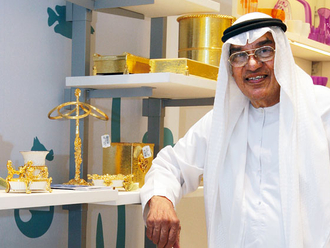Anwer Sher is a man who finds time to indulge in his twin passions of writing and photography, despite his day job as CEO of the ambitious City of Arabia development. The wise-cracking animal lover and former CEO of a bank tells Shalaka Paradkar why he thinks dinosaurs are still such a huge draw.
If you were to find yourself seated next to Anwer Sher at a ritzy do, think twice before asking him what he does for a living. Were you to pose the question to him, he would in all likelihood reply that he's a biscuit designer. He may even tell you that his mission in life is to work out how many nuts are necessary to make a perfect cookie.
Nutty? Not really.
A former banker who is now busy building icons in Dubai, Sher is the CEO of City of Arabia, the 20 million square foot development in Dubailand that will include Restless Planet, a Jurassic Park-like project with animatronic dinosaurs, among other things.
When complete it will house more than 34,000 residents. The development will also feature 34 residential towers, mosques, schools, clinics, convenience stores and the
Mall of Arabia which could be one of the biggest shopping centres in the world.
Little wonder, then, that his office is strewn with building models, presentation boards, elevation drawings of the Mall of Arabia and gigantic blueprints.
His desk is an ode to the bricks and mortar of his imagination: a camera, souvenirs, photos of horses, magazines on sailing and a selection of books scattered amid the paperwork.
There are several strings to Sher's bow - a former banker, he is a poet, columnist, published author and a fairly respected equine photographer. A father of two, he is also an animal lover who shares his Jumeirah villa with five dogs, two cats, two parrots and several hundred books at least a few of them on dinosaurs.
"What he doesn't know about dinosaurs isn't worth knowing," notes one of his colleagues.
With so many bragworthy accomplishments, you may wonder why Sher feels the need to occasionally describe himself as the guy who is trying to gauge the volume of air trapped in a slice of cake.
"It comes from my need to (surprise)people," he responds airily.
Somewhat of a rebel, Sher, 52, has his own way of bucking toffee-nosed conventions. Sometimes his comments may shock delicate sensibilities, but mostly he is a really funny man.
I
I am a survivor. I weighed 2.5 pounds at birth. That was back in the 1950s when they didn't have incubators and NICUs (neonatal intensive care units). I was fed milk from an ink-dropper and cried a lot. (I still do the latter!)
I am a strong individualist and don't believe in differentiating people on account of race, religion or birthplace.
I am obsessive about my interests. If I do something, I have to get it right. Whatever I do, I do (it)with passion - whether it's writing or photography ...
I would like to do more for society. I have worked with Medecins San Frontieres (MSF) and have been privileged to receive a lifetime achievement award from them.
I would love to one day sit in a car parked alongside Shaikh Zayed Road and just take pictures of people ... capturing the play of light and motion.
I think my purpose in life is to keep people happy.
ME
Me and my childhood:
I was born in Quetta, Pakistan, in a family of Pathans. I am the youngest of five children. I had two brothers (they are deceased], and two sisters. I was an extremely naughty child and got expelled from school regularly for playing pranks.
My father, Abdul Qayum Sher, then put me in a military college with a request to the authorities there not to expel me. Thus, I managed to complete my schooling. I then earned a bachelor's degree in political science from Punjab University, then a masters in international relations from Quaid-i-Azam University, Islamabad.
I grew up in boarding schools, but spent all my holidays working on a farm near Lahore. I drove tractors and farm machinery long before I could handle a car - which, to some people, explains the way I drive!
Our house was always open to visitors and friends. If you visited our house once, you would not have to wait for any of the family members to invite you again. You could walk in any time you wanted to. I don't remember a quiet weekend at home.
Me and banking:
After graduation, I had a choice - to do research or to branch off into banking. The latter appealed to me. I felt banking would be a good stop-gap arrangement while I decided what I really wanted to do. I ended up being in banking for more than 20 years!
To be honest, banking is quite boring. But I enjoyed it because I didn't look at it as 'banking', but as dealing with people. From 1976 to 1981, I worked in banking in Pakistan, then came to the UAE to work for BCC Emirates.
I started as head of international marketing, then became branch manager of Abu Dhabi main branch, then head of corporate and investments. I was appointed CEO in 1991 and the bank changed its name to the Union National Bank (UNB).
The most challenging project of my banking career was the restructuring of UNB. The bank was in poor shape; a crisis precipitated in 1991 (due to)the bankruptcy declared by BCCI (Bank of Credit and Commerce International), which owned 40 per cent of UNB. It took four years for UNB to turn the corner, but it did.
Many people thought we wouldn't be able to do it. I remember a banker from abroad meeting me in my office soon after I took over. He said he chose that particular (day)to come because, "Who knows whether your bank would be around next year?"
From that moment, I made it a point to send him clippings of every bit of positive news on UNB, with a note inscribed: "Still around!"
Banking to me was fun, because I made it fun. When I took over as CEO we had a huge budget for providing gifts for VIPs. I scrapped that budget and decided that every year we would use that money to publish a book for private distribution.
We produced some beautiful books on the UAE's wildlife, culture and history. It was fun because we were doing a job with some element of social purpose. I was never a good banker. Of course, I did manage to become CEO and achieve the usual measure of success. I met a lot of interesting people, (came into contact with)'society' and learnt a lot from it.
Banking also put me in touch with a great network of people. But it also taught me that these networks are only as good as the position you occupy.
The day I quit banking, my phone stopped ringing. I have a rule. Every year on January 2, I delete numbers from my mobile phone of the people who haven't bothered to call or keep in touch with (me over the past year].
When I took up my present job, five years after I had quit banking, the numbers that I had once deleted started reappearing on my phone. It's the one thing I don't like about this place - relationships and people are transitory. For me, my best friends are those whom I met 25 years ago, when I first came to this country.
Me and writing:
I was 14 when I wrote my first article. I sent it to a Pakistani newspaper, The Dawn, for publication. I didn't disclose my age when I sent them the piece and after it was published, they wanted me to do a series of articles.
But before starting off, they wanted me to meet with the features editor. I agreed and when I turned up at the appointed time, she was quite surprised to see a teenager.
She perhaps expected the writer to be a much older person. She even believed my father had written the article and asked me to fetch him. I tried hard convincing her that I was the author of the piece, but she refused to believe me. That was the end of my feature writing for that paper.
Over the past 22 years, I have written for many newspapers in the UAE. I have written a weekly column and have published a couple of books, too. Hopefully, the next two should be out soon. Writing helps me keep issues in perspective. I also love the discipline of sticking to a deadline and I find that it clarifies my thoughts.
The last book I wrote, Animal Stories, was released in the US last November - it's a storybook for young adults and for people who never grew up! These are the stories I made up to tell my children. I think everybody is a storyteller; we just use different media.
The book I am currently working on deals with the Middle East. It took me 10 years to write and should be out by September. I don't want to mention the working title because I don't want preconceived notions of the content.
However, poetry remains the genre closest to my heart.
Me and my mother:
I have always had a turbulent relationship with my mother, Amita Sher. There was a period when we didn't talk to each other for an entire decade (over a certain issue], but she has been the strongest influence on me.
My mother encouraged us to read and write. She was from Korvai Estate, Indore, and has had quite a dramatic life. A staunch nationalist who took part in India's freedom struggle, she met my father in 1940. He grew up in Switzerland and England and had never lived in the Subcontinent, having left it at the age of 2. (They met at a dance and)a few months later got married.
My mother was a prolific poet and writer and has nine books to her credit. One of the books she wrote, and my favourite, is Begum Samru.
It's the true account of a 19th-century Indian nautch girl, Begum Samru, who, as a teenager was handed over to a mercenary soldier of Luxembourg operating in India. She married him ? and after his death, ruled over Sardhana, a territory in northern India. Some day I would love to make it into a film.
Me and my family:
My fianceé, Eileen Verdieck, is a horse trainer by profession, one of the best as far as Arabian horses go. She is also a breeder and bloodstock groomer. We met three years ago at a Dubai dinner party.
I have two sons from my previous marriage and both have grown into fine young men - for that, all credit must go to their mother, Arifa Sher.
My eldest son, Aadil, 23, wants to be a chef. He is in the US with his mother, but will be moving to Dubai soon. Ali, 21, who lives with me in Dubai, is passionate about basketball.
The other members of my family are my pets. I have always had animals around me. I have five dogs, two cats and two parrots at home. I find it easier to be with animals than with humans.
Myself
What have been the most significant changes in the UAE that you've noticed over the years?
I have been in the UAE for 25 years and I have enjoyed every bit of it. I love the UAE; it's a country that has seen a lot of changes. It has done extremely well. What the Rulers have achieved in this region has been phenomenal.
Twenty years ago, if somebody had said to me Dubai would build a second airport with six runways and the capacity to handle 100 million people, I would (not have believed him]. But it is happening. And we have been, in our small way, part of that history.
After leaving banking, between 1999 and 2003, I ran my own consulting practice, Sher Consulting, which still exists. I enjoyed consultancy, but there were many defaulters. At the end of the day, I decided to get a job, although I had no intention of coming into a job like this. Not many people get a chance to restructure a bank and build iconic structures in Dubai.
What have been the turning points in your life?
Some incidents from my childhood have been particularly memorable. My father was a brigadier general in the Pakistan army. We were living in Quetta, where winter temperatures dip to -5?C.
One day, the weather was particularly horrible. It was snowing, there was sleet and, of course, it was very cold. (My siblings and I)were on our way to school when we noticed our father driving past us in his official car. I was 7, but felt very hurt and angry that he did not stop to give us a lift.
So, that evening, I asked him, "Baba, what is wrong with you? Why couldn't you drop us to school? It was cold and raining."
"Yes, the weather must have been horrible,'' he said. "But the car I was travelling in was an official one. It does not belong to you. The day you can afford your own car, you can drive it to school." As harsh as that was, it made me realise how important it is to keep one's balance in life.
At 36, I was asked to be the CEO of UNB, Abu Dhabi - a position that is usually filled only through promotions in the bank over the course of time. People think it was a big achievement that I was the CEO of a bank, but to me it was just a job.
A lot of people get caught up in the rat race. They forget that even if you win the race, you are still a rat.
Describe an experience that left a lasting impression on you.
I once had a flat tyre while driving in Sharjah and pulled over by the side of the road.
A man who looked like a labourer happened to be passing by and offered to help. Once the tyre was replaced, I offered him a ride and asked him where he would like to be dropped.
He said 'any place with a lot of office buildings would be fine'. He was looking for work and said he would knock on every door until he got it.
We returned to my office, where we washed up and had tea together. He then wished me goodbye and proceeded on his job hunt. This was a man who had helped me in my moment of adversity, yet his innate dignity would not allow him to ask me for a job as payback. I was touched and impressed.
Immediately after he left, I called our manager and asked him to stop the man near the door and offer him a job. We had to disguise it so his pride wouldn't be hurt.
What has been your life's credo?
As I get older, my ability to deal with people has improved, as has my tolerance. I now realise that a chain is only as good as its weakest link. We all fall into the greed trap. We all get into the self-obsessive, egotistical ride.
Not everyone knows what their purpose in life is. The most important purpose of any life is to be a good person. If 60 per cent of the time you can say you are a good person, then you are ahead in the game.












